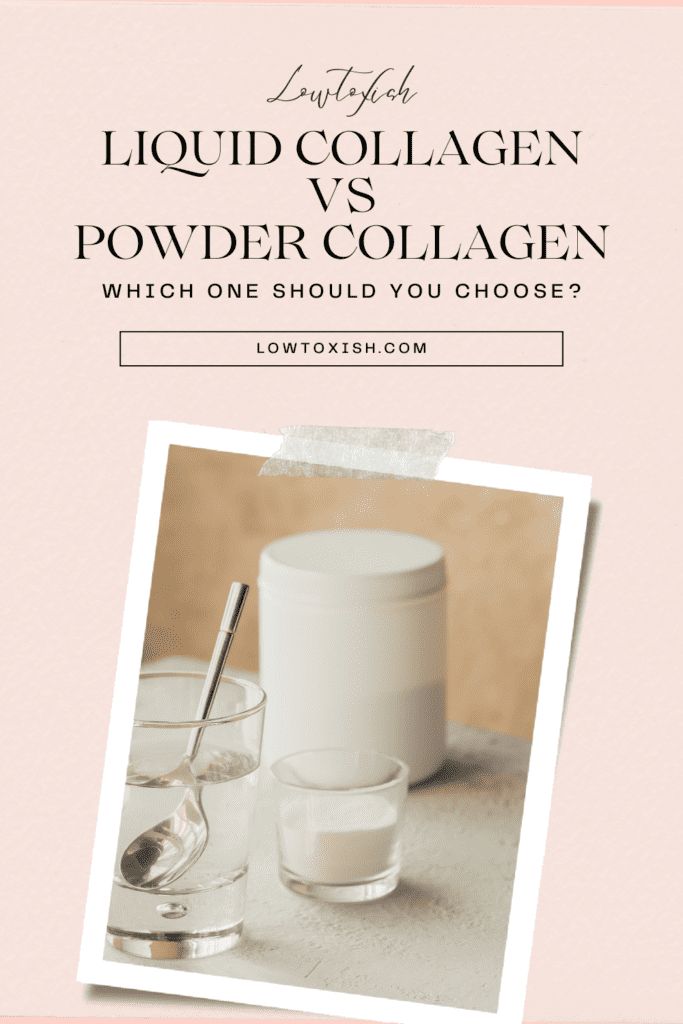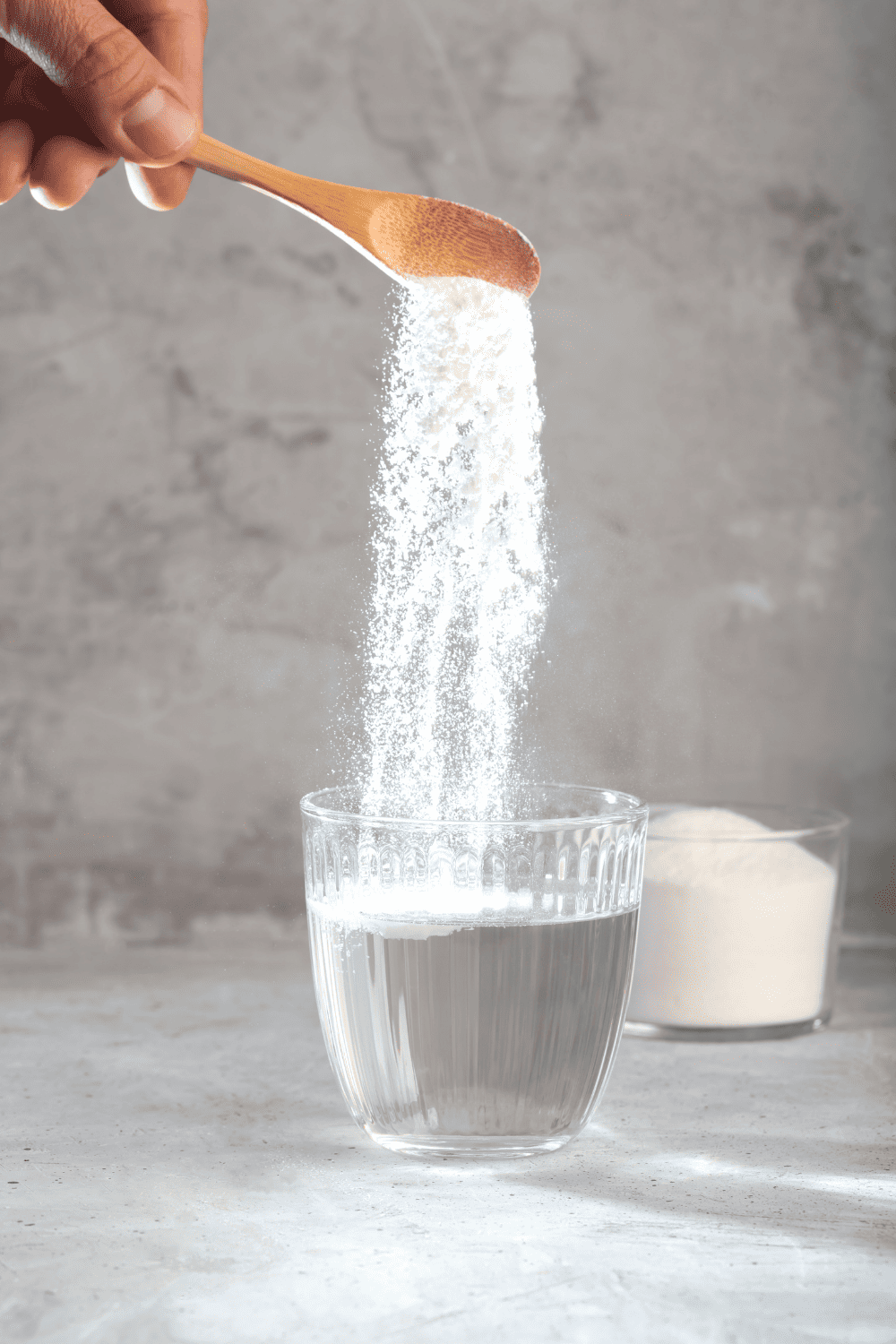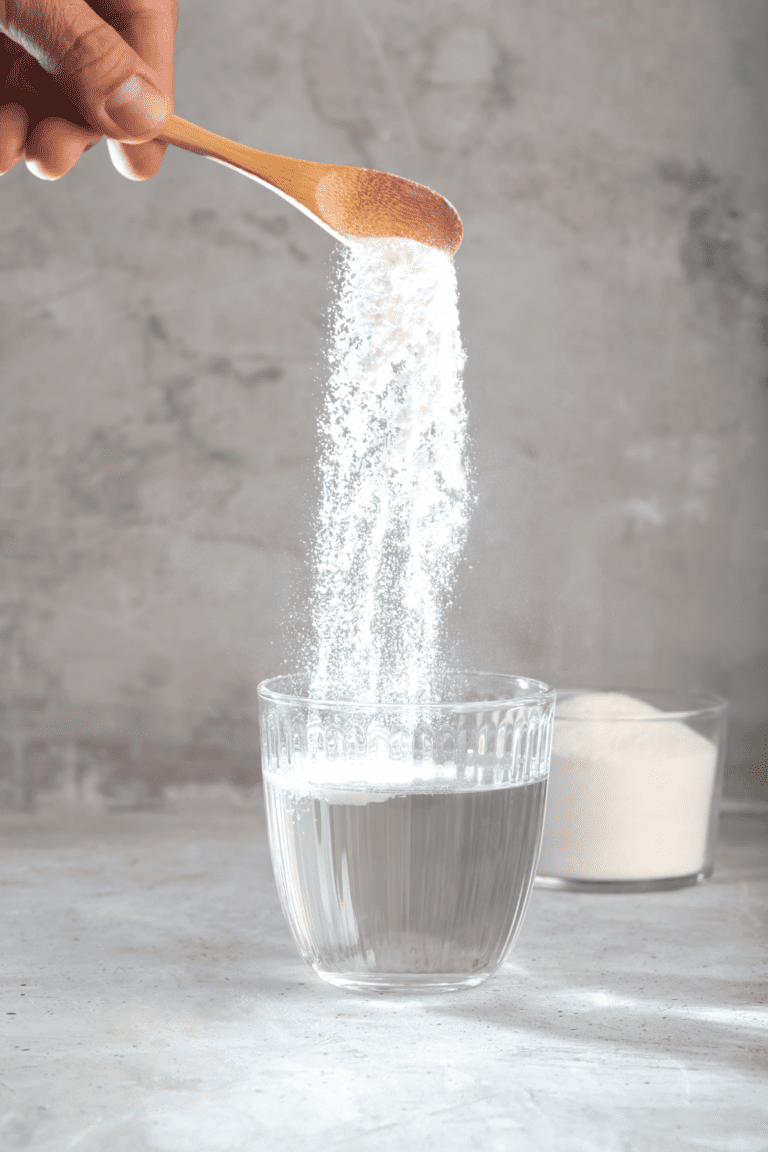Liquid Collagen vs Powder Collagen: The Ultimate Guide
This post is about liquid collagen vs powder collagen.

This post about liquid collagen vs powder collagen may contain affiliate links, which means I’ll receive a commission if you purchase through my link, at no extra cost to you.
Hey there, Wellness Warriors! 👋 Welcome to the showdown: Liquid Collagen vs. Powder Collagen. If you’re like me you have felt VERY overwhelmed by what social media and brands are telling you about collagen. From aiming for glowing skin to seeking robust joints, the quest for the perfect collagen form is real.
Let’s dive deep into the world of collagen, unravelling the facts and fiction to help you make an informed choice. Join us on this journey to untangle the truth about the differences (and similarities) between liquid collagen and powder collagen!
Liquid Collagen vs. Powder Collagen: How to Choose
Diving deeper into the nuances of liquid and powder collagen to help you make the best choice for your health and beauty goals.

Absorption: Getting Down to the Science
Before you read this section, I’m going to be honest. I could find no really substantial research touting liquid collagen as being supremely more bioavailable. By “substantial research” I mean the types of medical articles and reports I usually include in my write-ups.
In general, studies have been done on the bio-absorption and these studies shown (mostly done in rats) that collagen ingested orally (studies didn’t say if it was powder or liquid) does have a very good absorption rate.
Liquid Collagen:
- Typically boasts a higher bioavailability, meaning the body may absorb it more quickly and efficiently.
- Often preferred for those looking for immediate effects, such as improved skin hydration and elasticity but I don’t know if this is really true.
- Often contains other ingredients like vitamins that could add to or confuse the seen or felt effects (as in, are we really comparing apples to apples if liquid collagens almost always contain more than just collagen and unflavored single ingredient powder collagen is easy to find)?
Powder Collagen:
- Requires digestion before absorption, which might slow down its bioavailability compared to liquid form.
- Once absorbed, powder collagen, often in the form of collagen peptides, offers the same benefits as liquid collagen, including support for skin, hair, nails, and joints. Collagen peptides are small units of protein derived from collagen which the body can absorb more easily compared to larger collagen molecules. This enhanced bioavailability means that collagen peptides can be particularly effective in supporting the body’s collagen synthesis, making them a popular choice for those looking to maximize the impact of their supplementation efforts.
Convenience and Versatility: Fitting Collagen into Your Lifestyle

Liquid Collagen:
- Offers unmatched convenience; ready to drink without any preparation.
- Ideal for busy individuals who prefer a grab-and-go supplement.
Powder Collagen:
- Scores high on versatility; can be mixed into hot or cold beverages, smoothies, and even food.
- Perfect for those who enjoy integrating supplements into their cooking or baking routines.
- Perhaps messier to mix on the go and can be clumpy if not stirred/mixed well.
Taste and Texture: A Matter of Personal Preference
When it comes to incorporating collagen supplements into your daily routine, the sensory experience can significantly influence your preference for liquid or powder form.
Both taste and texture play pivotal roles in ensuring that the supplement is not only beneficial health-wise but also enjoyable to consume.
Liquid Collagen:
Liquid collagen often comes in pre-flavored varieties, offering a range of tastes from fruity to savory, designed to make the collagen consumption experience as pleasant as possible. Here’s what to consider:
- Flavored Options: Many users appreciate the convenience and immediate palatability of flavored liquid collagen, which can be consumed directly without the need for mixing or blending. There are also flavored options on the market.
- Texture Considerations: The smooth, often slightly viscous nature of liquid collagen makes it an easy addition to daily routines, especially for those who may have difficulties with powder supplements’ texture.
- Palate Fatigue: While the variety of flavors can be a plus, some users might experience palate fatigue, especially if they consume the same flavored collagen daily.
Powder Collagen:
Powder collagen, on the other hand, offers versatility that can cater to a broader range of taste and texture preferences through its ability to blend into various foods and beverages.
- Neutral Taste: Unflavored powder collagen is virtually tasteless, making it an ideal supplement to add to both sweet and savory dishes without altering their flavor profile.
- Texture Integration: When mixed properly, powder collagen can dissolve completely in both hot and cold liquids, making it undetectable in smoothies, coffee, and even soups or baked goods.
- Creative Control: For those who enjoy culinary creativity, powder collagen allows for experimentation in recipes, enabling users to incorporate health benefits into their meals without compromising on taste.
Price Point: Evaluating Cost-Effectiveness
Liquid Collagen:
- Generally more expensive per serving due to processing and packaging.
- May offer convenience that justifies the higher price for some users.
- Many liquid collagen drinks or pouches often contain less collagen and less protein per serving so I like to recommend looking at the price per 10g of protein when comparing collagen supplements.
Powder Collagen:
- Typically provides a lower cost per serving, offering better value over time.
- Bulk purchases can further reduce the price, making it a budget-friendly option for regular use.
Environmental Impact and Sustainability
In the ever-growing market of health supplements, the environmental footprint of products is becoming a significant factor for many consumers.
When it comes to collagen supplements, both liquid and powder forms have unique considerations regarding sustainability and ecological impact.
Liquid Collagen: Packaging and Waste
Liquid collagen is often praised for its convenience and ease of use, but these benefits come with environmental considerations:
- Packaging Materials: Liquid collagen typically requires more robust packaging to maintain the integrity of the liquid. This often means the use of plastic bottles or containers, which can contribute to increased plastic waste unless properly recycled.
- Transportation Weight and Volume: The liquid form also adds weight and volume, leading to higher carbon emissions during transportation from manufacturers to distributors and retailers.
- Shelf Life and Waste: While liquid collagen products may have preservatives to extend shelf life, the risk of waste due to expiration can be higher if products are not consumed in time.
Powder Collagen: A More Sustainable Option?
Powder collagen, on the other hand, tends to have a lighter environmental footprint for several reasons:
- Efficient Packaging: Powdered supplements can be packed in lighter, more compact containers, reducing material use.
- Reduced Transportation Impact: The lightweight and compact nature of powder collagen results in lower carbon emissions during transport, as more products can be shipped in a single trip.
- Longer Shelf Life: Powdered supplements generally have a longer shelf life than their liquid counterparts, reducing waste from expired products.
What’s the Buzz About Collagen? Liquid Collagen vs Powder Collagen
In recent years, collagen has surged from a niche health supplement to a staple in the wellness and beauty community. This buzz isn’t without good reason. Collagen is the most abundant protein in the human body, playing a crucial role in various biological functions. It provides structural support to skin, bones, and connective tissues, making it vital for maintaining the overall integrity and youthfulness of the human body. Let’s delve deeper into why collagen is garnering so much attention and how it supports the health of the human body.
The Foundation of Youthful Skin
Regular intake of collagen, whether from liquid collagen drinks or powder collagen peptides, can combat the visible signs of aging. By boosting the body’s collagen levels, individuals may notice a reduction in fine lines and wrinkles, along with improved skin hydration, contributing to a more youthful and vibrant complexion.
- Elasticity and Hydration: Collagen is pivotal in maintaining the skin’s elasticity and hydration. However, it’s important to note that the synthesis of collagen in the human body relies heavily on the presence of vitamin C. This essential nutrient acts as a co-factor in the collagen synthesis process, helping to build and repair connective tissue. As we age, our body’s natural collagen production declines, leading to common signs of aging such as fine lines, wrinkles, and drier skin. Supplementing with collagen, alongside ensuring adequate intake of vitamin C, can help replenish these levels, potentially reversing some signs of aging and promoting a more youthful complexion.
- Healing Properties: Beyond its anti-aging benefits, collagen plays a significant role in the skin’s healing process. It’s essential for wound healing and can improve the appearance of scars, making it a key ingredient in many skincare products and treatments.
Stronger Hair and Nails
Collagen’s benefits extend beyond just skin health; it’s also essential for promoting stronger nails and nail growth.
Users often report that consistent collagen supplementation leads to nails that are less prone to breaking and brittleness, alongside a noticeable acceleration in nail growth. This protein provides the necessary nutrients to reinforce the nail bed, resulting in healthier, more resilient nails.
- Hair Growth and Strength: Collagen provides amino acids that can help build hair proteins and strengthen the skin that contains your hair roots. It may also prevent hair follicle damage and graying. Among the various types of collagen available, marine collagen is particularly noted for its ability to support hair growth and strength.
- Nail Health: Regular collagen supplementation has been shown to increase the strength of nails by preventing brittleness. Additionally, it can stimulate nails to grow faster and healthier.
Joint and Bone Health
- Joint Mobility and Pain Reduction: Collagen is a major component of cartilage, the connective tissue that is necessary for joint health. Supplementing with collagen has been linked to reduced joint pain and the potential to prevent joint degeneration, a boon for those with osteoarthritis or other joint disorders. The integrity of our connective tissue plays a pivotal role in our mobility and comfort, making collagen supplementation key for maintaining healthy joints and supporting the connective tissue throughout the human body.
- Bone Strength: Collagen gives our bones structure, helping to keep them strong and flexible. The decrease in collagen as we age can lead to a decrease in bone density, making supplementation a key factor in bone health maintenance, particularly for postmenopausal women at risk of osteoporosis.
Muscle Mass and Gut Health
Collagen supplementation has been linked to improved muscle strengths, particularly due to its high glycine content, an amino acid that supports the synthesis of creatine.
This relationship suggests that collagen can play a crucial role in enhancing physical performance and muscle recovery, making it a valuable addition for athletes and individuals engaged in regular physical activity.
- Muscle Mass Maintenance: Collagen contains a concentrated amount of glycine, an amino acid involved in the synthesis of creatine. This can provide muscles with the energy needed to power through workouts, potentially aiding in building and maintaining muscle mass.
- Gut Health: Though research is still in its early stages, some studies suggest collagen may help improve gut health and combat leaky gut syndrome by strengthening the intestinal barrier and supporting the stomach lining.
Why the Sudden Popularity? Liquid Collagen vs Powder Collagen
The increasing interest in collagen supplements is largely due to our growing understanding of how essential collagen is for the human body and the recognition that we produce less collagen as we age.
This decrease in collagen production can lead to weaker joints, less elastic skin, and more brittle hair and nails. The popularity of collagen supplementation stems from its potential to counteract these effects by providing the body with the building blocks it needs to maintain higher levels of collagen, despite the natural decline.
Optimizing Collagen Supplementation: Finding the Best Way
Identifying the best way to incorporate collagen into your health regimen requires considering your personal health goals, lifestyle, and preferences. While liquid collagen supplements offer convenience and fast absorption, powder collagen provides versatility and cost-effectiveness.
The best way to ensure you’re maximizing the benefits of collagen—whether aiming for improved skin elasticity, stronger nails, nail growth, or muscle strength—is to choose a form that fits seamlessly into your daily routine.
Additionally, combining collagen supplementation with a diet rich in vitamin C can enhance collagen synthesis, making this nutrient pairing a powerful strategy for those looking to support their body’s natural collagen production.
Understanding Liquid Collagen vs Powder Collagen: Proteins and Dosage
When exploring collagen supplements, it’s crucial to consider the quality of collagen proteins and the grams of collagen per serving provided by the product. Collagen proteins are the building blocks that support skin elasticity, joint health, and muscle strength.
The effectiveness of a supplement often depends on the type of collagen proteins it contains and their ability to be absorbed by the body. Hydrolyzed collagen peptides are easier to digest and absorb than regular collagen peptides. I’ve found that most of the safest and best collagen supplements contain hydrolyzed collagen peptides.
The amount of protein a serving of collagen supplement contains usually varies from 2g of protein per serving to about 20g of protein per serving. I struggle with getting enough protein in each day so I like to personally opt for supplements that offer 10-20 grams of protein per serving.
Liquid Collagen: The Quick Fix?
Liquid collagen drinks are often touted for their convenience and potential for rapid absorption, making them a favored choice among those seeking immediate benefits from their collagen supplementation.
These ready-to-consume beverages bypass the need for mixing or preparation, offering a straightforward way to integrate collagen into one’s daily routine.
Advocates for liquid collagen drinks highlight their efficiency in delivering collagen’s skin, joint, and overall health benefits directly, arguing that the liquid form may enhance the body’s ability to quickly utilize the nutrients.
Why Choose Liquid Collagen?
- Superior Absorption: Advocates for liquid collagen argue that its liquid form allows for faster and more efficient absorption by the body compared to powders or pills.
- Ease of Use: There’s no denying the convenience factor. Liquid collagen doesn’t need to be mixed into a beverage or meal; it’s ready to consume straight from the bottle.
- Cocktail of Health: I’m going to be honest, the only reason I see choosing liquid collagen over powdered collagen is if you find a brand that is clean and safe, has the amount of protein and collagen pers serving that you want AND that offers the additional vitamins and minerals or adaptogens that you want. If you pick a collagen cocktail that has all the other ingredients you want, this could be a cost-effective and health effective way to go.
Cons of Liquid Collagen
Points to Ponder
- Cost Considerations: Liquid collagen often comes with a higher price tag compared to powdered forms. This is something to weigh against the convenience and potential for better absorption rates.
- Taste and Palatability: When you use an unflavored powered collagen you can mix it into your favorite drink. When you use a liquid collagen you are given a flavor or taste. If you love the flavor then that’s a win.
- Other Ingredients: While other ingredients can be a big positive, you might also find ingredients in liquid collagen supplements that are not doing your body any favors.
- Packaging waste/Eco-Friendliness: When you opt for single serving liquid collagen you are looking at a LOT more packaging waste. Some liquid collagens are more like a cough syrup and you just dose them out of a big bottle every day. This cuts away at the convenience and portability factor but also cuts down on packaging waste.
- Less Transparency: There is way less transparency with liquid collagen brands and the safety (no heavy metals and non-gmo) of liquid collagen than there is powder collagen… not sure why this is but it’s just harder to find.
Making an Informed Choice: Liquid Collagen
Before jumping on the liquid collagen bandwagon, it’s crucial to consider your lifestyle, budget, and taste preferences.
While the convenience and potential for faster absorption are appealing, they should be weighed against the cost and your personal dietary needs.
As with any supplement, consulting with a healthcare provider can help ensure that it’s a suitable addition to your health regimen.
My personal final thoughts on liquid collagen are: If you find a brand that is clean, tastes amazing, has the amount of protein you want, has the extra vitamins and compounds you want, and is in your budget- GO FOR IT!
Liquid Collagen Brands to Consider
Powder Collagen: The Flexible Choice?
Powder collagen has established itself as a staple in the health and wellness sector for good reasons. Its versatility, ease of integration into daily routines, and wide range of options make it a go-to choice for many collagen users.
But what exactly sets powder collagen apart as the flexible choice, and how can you maximize its benefits? Let’s dive deeper.
Unmatched Versatility: Powder Collagen
- Diverse Usage: Powder collagen’s foremost advantage is its ability to blend seamlessly into almost any liquid or semi-solid food. From morning coffees and smoothies to soups and baked goods, powder collagen can be incorporated without altering the taste or texture of your favorite foods.
- Customizable Dosages: With powder collagen, you have the control to adjust your dosage as needed. This flexibility is particularly beneficial for those who may require higher or lower doses based on their health goals, dietary needs, or medical advice.
Quality and Concentration: Powder Collagen
- High Concentration: Many powder collagen products boast a high concentration of collagen peptides, ensuring you get a potent dose of the essential amino acids needed for collagen synthesis in the body.
- Purity Options: The market for powder collagen is vast, offering a range of products that cater to different dietary restrictions and preferences, including grass-fed, marine, organic, and non-GMO options. This variety ensures that users can choose a product that aligns with their health values and dietary needs.
Considerations for Use: Powder Collagen
- Solubility: While most powder collagens are designed to dissolve easily in both hot and cold liquids, some may require a bit more stirring to avoid clumping. Opting for a well-micronized powder can enhance solubility.
- Taste and Texture Sensitivity: For those sensitive to changes in taste or texture, it might take some experimentation to find the right powder that blends invisibly into their preferred beverages or meals.
Making the Most of Powder Collagen
To truly benefit from the flexibility of powder collagen, consider incorporating it into different aspects of your diet:
- Morning Rituals: Start your day by adding collagen to your coffee, tea, or breakfast smoothie. It’s a simple way to ensure you don’t forget your daily dose.
- Cooking and Baking: Experiment with adding collagen powder to recipes. It can often serve as a protein boost in baked goods or as a nutrient-dense addition to soups and stews without altering the flavor.
- Post-Workout Recovery: Mix collagen into your post-workout shake or water. Its amino acids can help support muscle repair and recovery.
Powder Collagen Brands to Look At
These are my top two suggested powder collagen options based on protein content, safety/testing, and price but I have more top options here.
Conclusion: Liquid Collagen vs Powder Collagen
I’ve shared a lot to consider. When I write these articles, sometimes I go in with a strong opinion and other times I am not really sure.
When I wrote this post about powder collagen vs. liquid collagen I was VERY confused by all of the noise out there- mainly I think from collagen companies and people that were part of mlms that sold collagen supplements.
I personally don’t think the research is there to say that liquid collagen is so superior in bio-availability that it warrants discounting powdered collagens. If you have the medical articles to show this, please send them to me so I can edit this article and link to them…. I just don’t think the evidence is worth the hype.
After doing the research I really think it boils down to these things:
- If you want more of a health cocktail with lots of added vitamins and adaptogens- consider liquid collagen.
- If you like to add collagen to your coffee, smoothies, soups, or baked goods- powder is probably the way to go.
- If you care about how safe and clean the collagen is, it might be easier to go with powder collagen.
- If you want the most cost-effective option, powder is probably the way to go.
- If you care about eco-sustainability, most of the time powder is the way to go or a large container of liquid collagen that you dose yourself.
- If you like having a ready-to-go dose for travel and portability, liquid is easy and kind of fun.
One last note… when you are choosing a collagen supplement, beyond deciding if you want liquid collagen or powder collagen, you also might want to consider if you want marine collagen or collagen from cow or chicken AND if you care if it is Type 1, 2, 3, or 4.
Most marine collagen is Type 1 and 2 and most bovine and chicken collagen is a combo of Type 1 & 3. There are blends out there that blend marine collagen with egg parts and bovine collagen to produce a collagen blend that contains all 3 types of collagen but more isn’t always better so just know that those are two other things to consider.
This post was about liquid collagen vs powder collagen.
More posts like this…
10 Amazing AIP Breakfast Smoothies to Try Using AIP Safe Protein Powders
Gluten and Dairy Free PCOS Recipes For Balancing Hormones
How to Craft Adaptogenic Teas: 5 Recipes to Try
The Best 6 Non Toxic Waffle Makers: PFOA, PFAS, and Teflon Free.
Favorite Health Posts
Favorite Health Posts
Favorite Posts
Last update on 2026-02-12 / Affiliate links / Images from Amazon Product Advertising API
This product presentation was made with AAWP plugin.






















